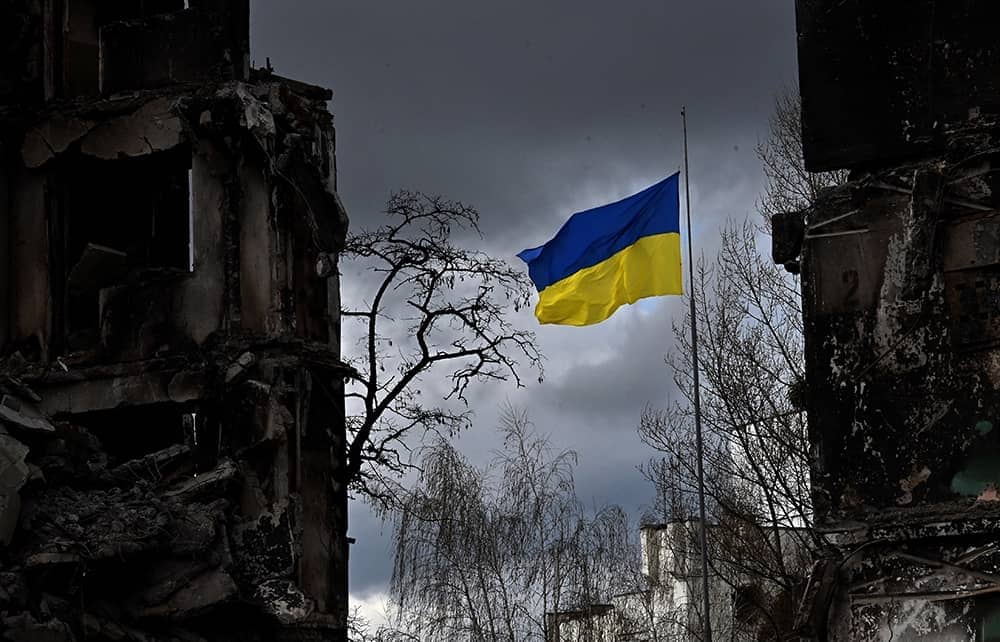The first few weeks of Russia’s invasion of Ukraine went so badly that it was tempting to see the withdrawal of troops from around Kyiv as the beginning of the end. The loss of the battleship Moskva has humiliated Vladimir Putin further, undermining any lingering hope he may have had of being able to claim total victory in time for Russia’s military celebrations on 9 May.
But it would be a dangerous delusion to think that Russia’s invasion of Ukraine is destined to be a failure. Heroic though Ukraine has been so far, its struggle could yet be lost. As the conflict enters a critical new phase, it is vital that Britain does not relax military support for the country. Indeed, it is time to step it up.
Any kind of green light over Luhansk and Donetsk could lead Putin to eye up the Baltic states
By giving up on his efforts to capture Kyiv and thereby force a rapid surrender of the whole of Ukraine, Putin has started to fight the war which many in the West assumed he would fight in the first place: attempting to annex the regions of Luhansk and Donetsk, which together make up the Donbas in the east of Ukraine. Not only are these areas potentially easier to capture, sharing a 200-mile-long border with Russia and filling in a gap between Russia and the already annexed Crimea, but Russian forces can expect resistance to be lighter. Both Luhansk and Donetsk are already under the control of breakaway pro-Russian regimes, styling themselves as ‘people’s republics’. It is highly likely that Putin will attempt the same trick here as he succeeded in pulling off in Crimea in 2014: to assert military control and then hurriedly hold some kind of referendum which he hopes would give a sense of legitimacy to their annexation.
If Putin is allowed to keep taking territory from neighbouring countries, it is certain that he will keep coming back for more, using the excuse that he is merely defending Russian speakers who are being oppressed. It is the same excuse Hitler used about German speakers in the Sudetenland. Given that most of Russia’s neighbours spent 70 years as part of the Soviet Union, inevitably large numbers of Russian speakers reside within them. Like Ukraine, the Baltic states have large numbers of people who identify as Russian – around 25 per cent of the population in the case of Latvia. Any kind of green light given to Putin over Luhansk and Donetsk could lead him to eye up the Baltic states, in part or as a whole. That, needless to say, would bring Nato into direct conflict with Russia.
Altogether, the battle for the Donbas presents a potentially more straightforward target for Russian aggression. In the battle for Kyiv, Russia had condemned its troops – many of them conscripts who had been misled about the nature of the undertaking they had joined – to a grubby fight for urban territory. Add to that a well armed and motivated civilian population and the error of trying to enter the city via an exposed tank column, and Russian forces were always likely to be bogged down. In Donbas, where there is a lot of open ground, the topography will be more favourable to a Russian advance and less favourable to embedded defence.
Drier conditions can be expected as summer approaches, and Russian forces can be fed via shorter supply lines than those near Kyiv. Russian forces – even badly motivated ones – have already been able to gain territory in Donbas in a way that proved harder in Kyiv and the north. Smaller cities – such as Kreminna, with a population of 18,000, which fell this week – have proved easier pickings. Most of Mariupol now lies in Russian hands, the native population all but driven out and 95 per cent of buildings damaged or destroyed.
So far, Ukraine’s allies have shown they recognise the urgent need to keep up the supply of military equipment, and have responded to President Zelensky’s requests, if not in full then at least with substantial donations. The UK government has announced that it will send anti-aircraft vehicles, allowing Ukrainian forces to target Russian aircraft more accurately than they can with shoulder–based weapons. The US has sent $800 million worth of artillery equipment. The Netherlands this week announced it will send armoured vehicles, which are essential if Ukraine is to fight on open ground.
But there needs to be an awareness in the West that this campaign is for the long haul, and that it will require accompanying humanitarian support. Military budgets across European countries must be increased to aid the supply of weapons to Ukraine. And pressure must continue to be applied on Germany to step up its meagre offerings. Short of regime change, it is hard to see Russia giving up on its campaign in the near future, given the resources and political capital which Putin has invested in it. Having drummed into his people the falsehood that Russia is engaged in a fight to ‘liberate’ Ukraine, he cannot now go back.
The reality is that Ukraine is likely to be engaged in an attritional campaign against Russian forces for years to come. Its economy, already shattered in the past few weeks, will remain suppressed and its people in need of continuing support to fight. Ukraine applied for but was never accepted as a member of Nato. Nevertheless, it is imperative that the democratic world continues to make it clear that Ukraine is one of us and will not be abandoned.






Comments